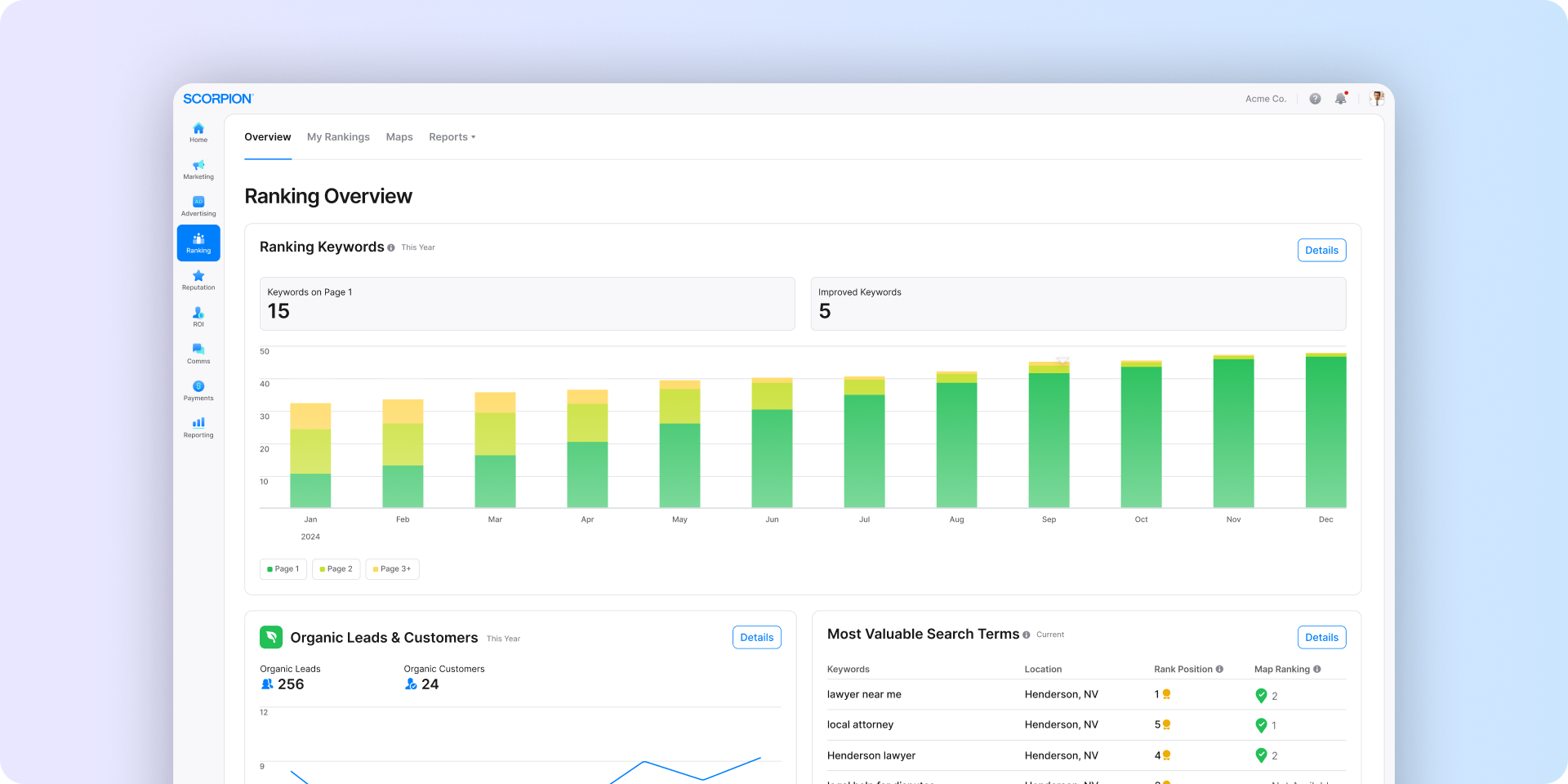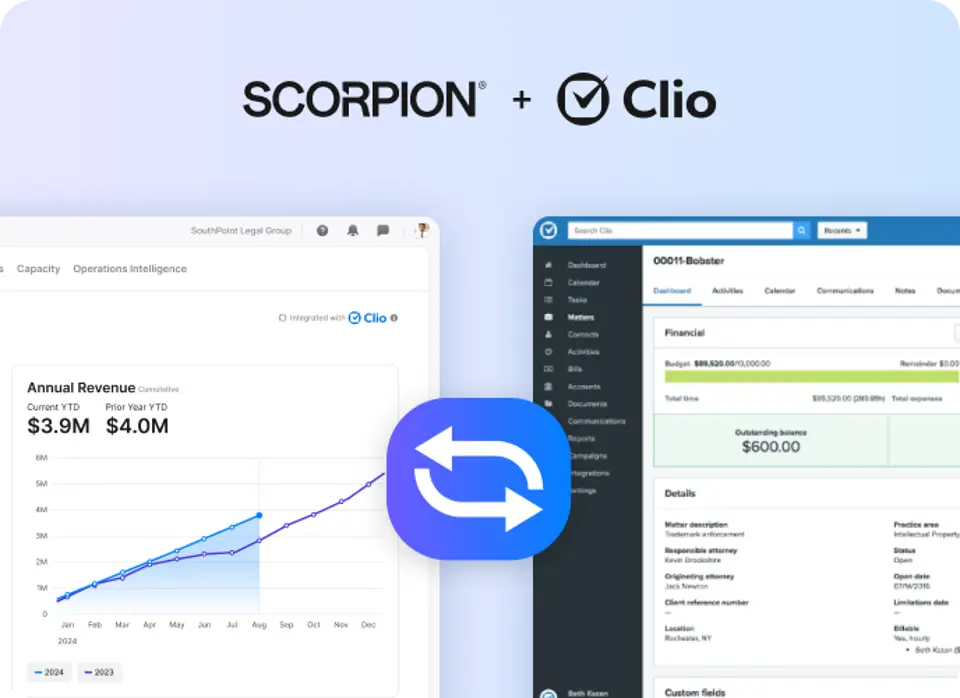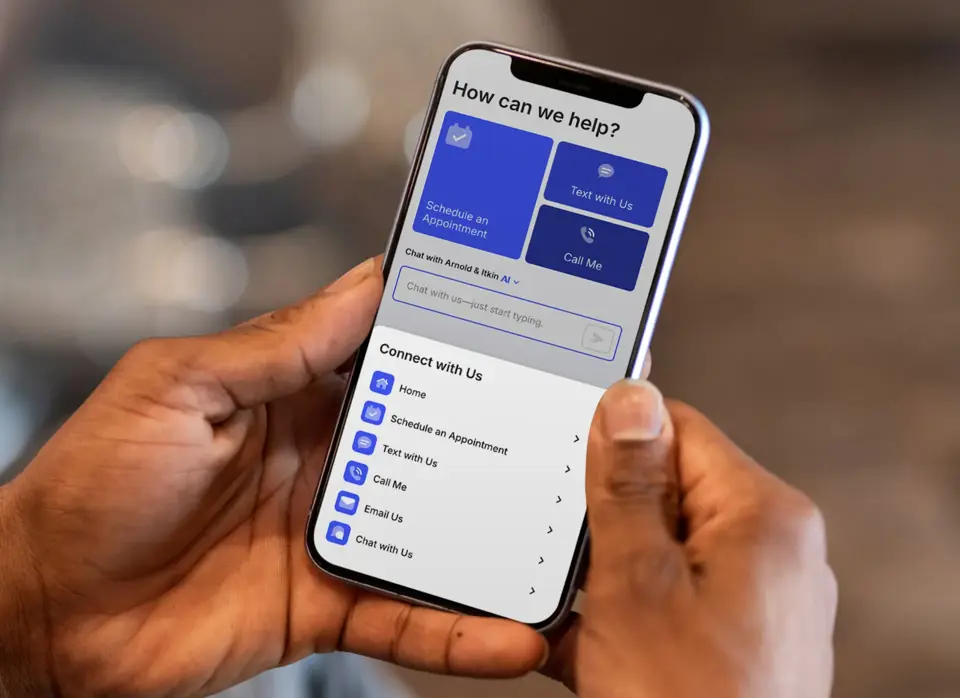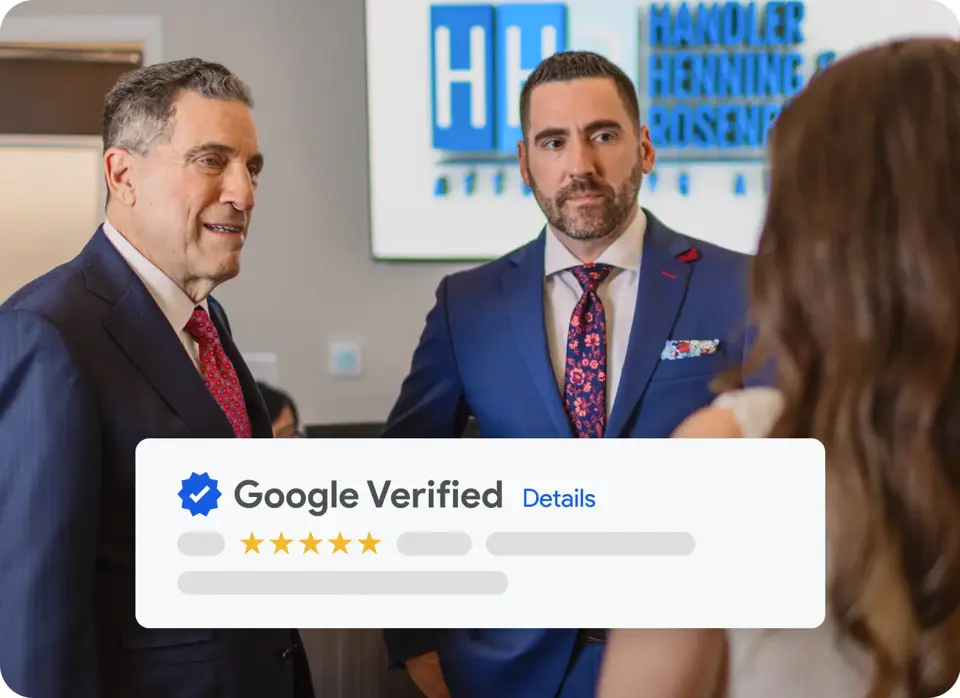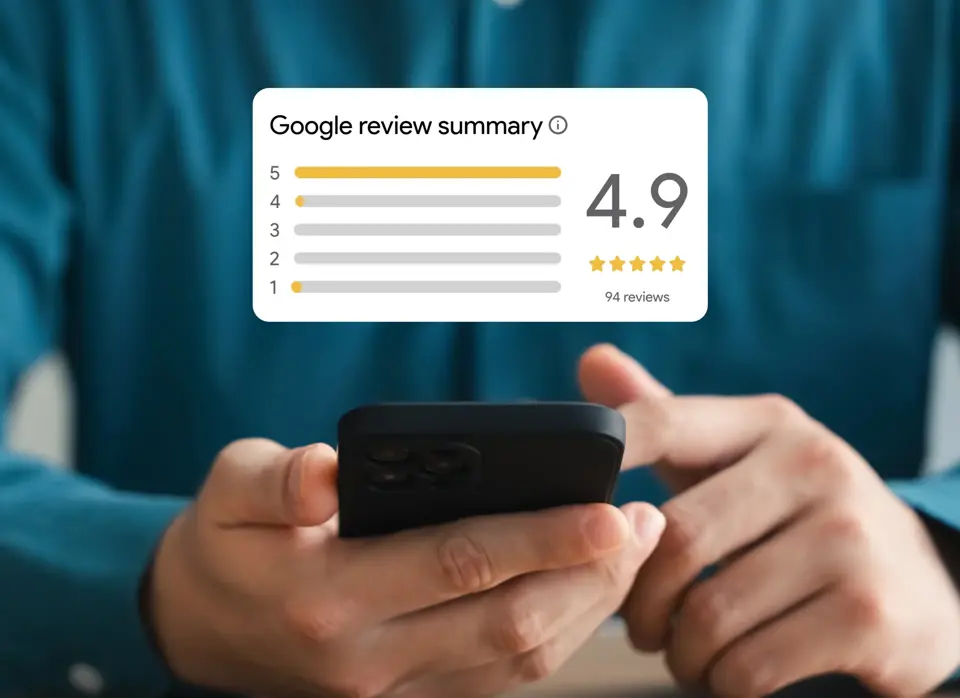Search Engine Optimization (SEO) is the most cost-efficient way to put your firm in front of prospects who are actively looking for legal help. Done right, it ranks your site in Google’s organic results, drives high-intent traffic, and fills your calendar with the kinds of cases you want most.
Below is a streamlined guide that discusses:
You’ll also see real-world wins and how Scorpion’s Ranking AI and RevenueMAX turn rankings into revenue.
What Is SEO (Search Engine Optimization) for Attorneys?
SEO stands for “search engine optimization,” which means making your law firm more visible on search engines. When someone uses Google (or another search engine) to look up a lawyer or get legal advice, SEO is what determines which law firm websites show up at the top of those search results.
Unlike paid ads that appear at the very top of Google, SEO focuses on the organic listings that show up just below the ads—the links that Google ranks because it thinks they are the most relevant and helpful. For example, if a potential client searches for “Divorce lawyer in Milwaukee,” you want your firm’s site to be one of the first results they see.
The higher your site ranks on the search results page (especially if you can appear on the first page of results), the more people will click through to your site.
Done right, SEO helps ensure that when people search online for the legal services you offer, they find you, not a competitor.
Why SEO Matters for Law Firms
Clients start with search. Prospects type “divorce lawyer Milwaukee” or “do I need a will in Texas” long before they pick up the phone. Ranking high puts you in front of that intent.
Organic links earn trust. Many people skip ads and click the listings Google deems most relevant. A top organic spot signals authority before they ever land on your site.
ROI compounds over time. Unlike pay-per-click, you don’t pay for every visit. Strong SEO lowers acquisition costs and keeps paying off month after month.
When SEO Works Best

SEO is particularly powerful during the research and consideration stages of the client journey. These are the phases when a person has realized they have a legal problem or need and is actively searching for information and evaluating their options.
Let’s break down what that means:
- The “Research” Stage: This often begins when a legal issue arises. If someone is served divorce papers, their first step might be to Google “How is child custody decided in Wisconsin?” They might not be ready to pick up the phone yet, but they’re gathering information. This is a prime opportunity for SEO. If your website has content that answers those questions (e.g. a blog post about custody processes), you’re not only getting them onto your site—you’re also building trust and positioning your firm as knowledgeable and credible.
- The “Consideration” Stage: Here, the potential client knows they likely need an attorney and is comparing specific firms. They might search for “best personal injury attorney near me” and look for evidence of expertise, experience, and reliability—things like case results, client testimonials, and online reviews. SEO plays a crucial role in this stage too, if your website shows up in local search, contains helpful content, and displays your qualifications.
High Intent = Higher Conversion
When someone googles “DUI lawyer near me” or reads attorney reviews, they’re almost ready to hire. That’s why SEO leads convert fast—they’re urgent, informed, and narrowing their options. Ranking well puts your firm at those decisive moments, turning high-intent searches into signed cases.
SEO & the Client Funnel
SEO owns the top and middle of your funnel: it grabs attention in search results and drives prospects to your site to learn more. A strong site then moves them from consideration to consultation. In short, SEO gets you found and—because your content builds trust—chosen.
By the time an SEO lead calls, they’ve already vetted you online and are primed to move forward.
Actionable SEO Strategies for Law Firms
Now that we’ve covered the “what” and “why,” let’s jump into the “how.”
How can your law firm improve its SEO and start reaping these benefits? Below are actionable strategies, specifically tailored for attorneys.
1. Keyword Research & Targeting for Attorneys
Identify what your clients are searching, and align your website content with those terms. Keyword research is the foundation of SEO.
For a law firm, this means figuring out the exact phrases people use on Google when they need legal services you offer. Often, these include practice area + location keywords (e.g., “DUI lawyer Chicago”, “estate planning attorney Dallas”) as well as specific questions (“What to do after a car accident in [State]”).
How to do it: Brainstorm the services you provide (e.g., “divorce lawyer,” “personal injury attorney,” “business litigation”) and add the locations you serve. Use tools like Google’s Keyword Planner or simply Google’s own search suggestions to see variations. For example, type “personal injury attorney [Your City]” and note the autocomplete suggestions or related searches at the bottom—those can be gold mines of what real people search.
- Make a list of priority keywords relevant to your practice.
- Then, ensure you have dedicated pages on your website for each major service/keyword. If you want to rank for “family law attorney Miami,” you should have a page on your site that clearly is about Family Law services in Miami. Each page should use the keyword naturally in the title, headings, and body content. This signals to Google that your page is highly relevant to that search term.
- Remember to write in a way that’s client-friendly—answer the exact questions a client would have.
- If someone searches “Do I need a lawyer for a minor car accident?”, consider writing a blog post or FAQ on that topic.
Finally, keep an eye on emerging terms. For example, with changes in technology, people might search “do I need a lawyer or can AI draft a contract?” or new law changes (e.g., searches spiked for terms related to the CARES Act during COVID). Continuously refining your keyword list and updating your content helps you stay relevant.
This might sound time-consuming, but it’s something you or your marketing partner (like Scorpion) can work on steadily—and it pays dividends by continuously funneling relevant traffic to your site.
2. Local SEO: Be Visible in Your Geographic Market
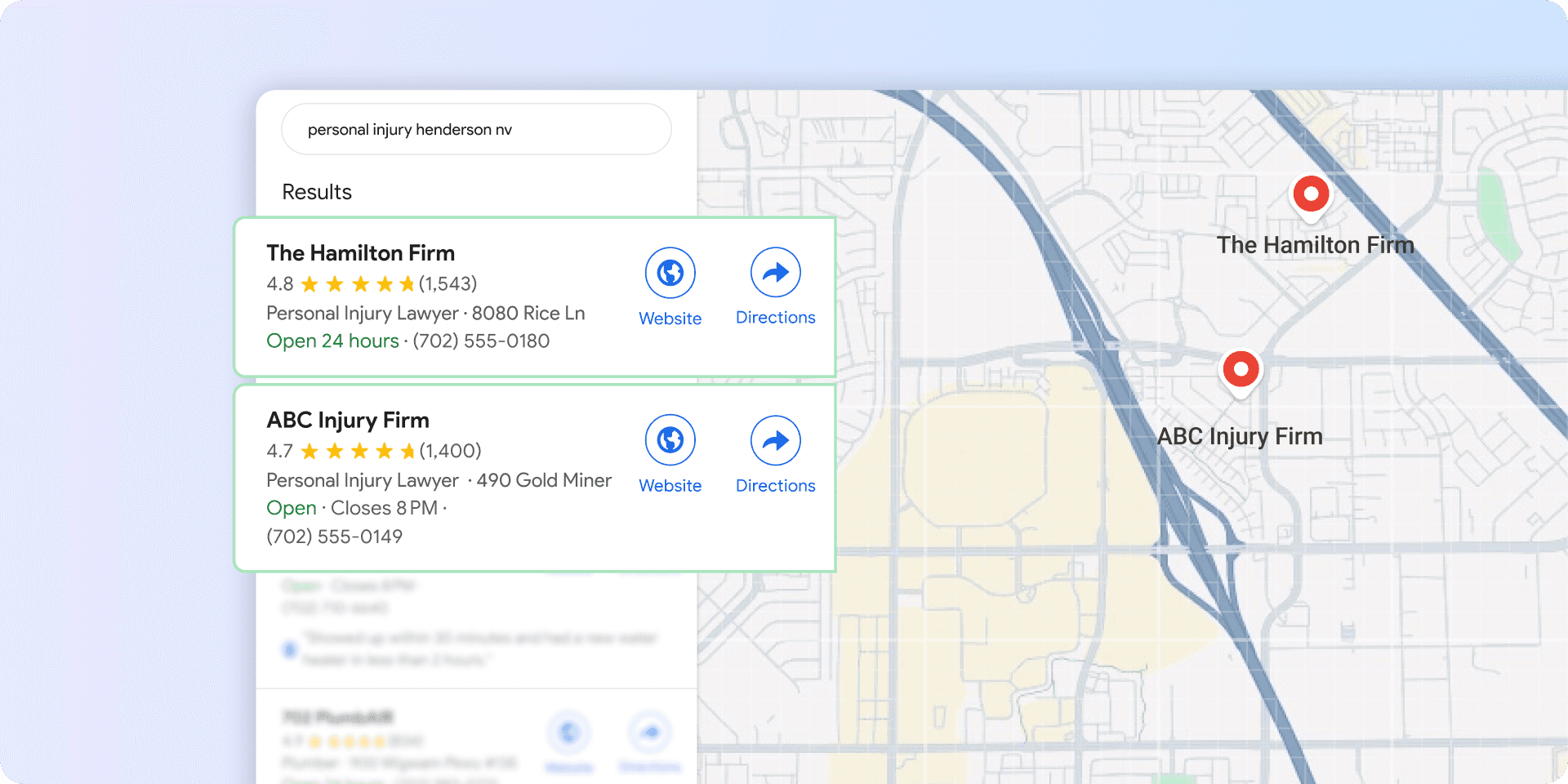
Local SEO focuses on optimizing your online presence to rank in location-based searches, particularly in Google’s “Map Pack” (the map and listings that show up for searches like “lawyer near me”). Why is this important? Because when people search for an attorney, Google often shows local results prominently—and a significant number of searchers click on those map listings.
How to do it: Start with your Google Business Profile (formerly Google My Business). If you haven’t claimed and optimized this, do it immediately—it’s free and incredibly impactful.
- Fill out your law firm’s Google profile completely: business name, address, phone, website, hours, and especially the category (make sure you choose appropriate categories like “Personal Injury Attorney,” “Family Law Attorney,” etc.). Write a clear description of your services.
- Consistency is key—ensure that your name, address, and phone (NAP) information is identical everywhere online (your website, directories, etc.) to build trust with Google’s local algorithm.
- Next, gather client reviews on Google. Reviews not only influence clients, but they also factor into local rankings. A steady flow of positive reviews will boost your visibility and make you stand out in the map listings. Many people will literally choose from the three firms Google shows in the map pack; having a high star-rating and number of reviews can be the deciding factor on who gets the call.
- List your firm in reputable online directories (legal directories like Avvo, FindLaw, Justia, as well as general ones like Yelp, Bing Places, Apple Maps). These listings (called “citations”) help corroborate your firm’s existence and location. The more quality citations with consistent NAP info you have, the better for local SEO trust.
- On your own website, make sure to include your location details on key pages—don’t hide your address on a single Contact page. For instance, if you serve multiple cities or have multiple offices, consider having location-specific pages (e.g., “Los Angeles Criminal Defense Attorney – [Firm Name]”) with content about serving clients in that area.
- Create locally relevant content when possible. Maybe write about local court procedures, or a news-worthy case in your area, or “What to know about DUI laws in [your state].” This signals local relevance both to Google and to users.
- Pay attention to the technical aspect of local SEO: if you have a physical office, embed a Google Map on your contact page, and use local schema markup (if you have a web developer, they’ll know this) to mark up your address.
3. Website Content & Structure: Build a Client-Friendly, SEO-Friendly Site

Your website is your digital office—it needs to be welcoming to both human visitors and search engines. On-site SEO involves organizing and optimizing your website’s content so Google can easily understand it and users can easily find what they need.
For law firms, a well-structured site and quality content can significantly improve your rankings and conversion of visitors to leads.
Here are key practices:
- Create Dedicated Service Pages: Each major service or practice area (like car accidents, slip and fall accidents, and burn injuries for a personal injury firm) should have its own page. Each page should have at least a few hundred words of useful information about that service, common questions, your approach, etc. Not only does this help with SEO keywords, but it also means a visitor who lands on that page gets all the relevant info in one place.
- Use Clear Headings: Use headings (H1, H2, H3 tags) that include keywords and describe the sections. On a divorce page, you might have sections with headings like “Understanding the Texas Divorce Process” or “Los Angeles Child Custody FAQ,” etc. This not only helps readers skim, but Google uses headings to grasp the page topics.
- Make It Easy to Navigate: Ensure your main menu navigation is straightforward—list your key practice areas, an About page, Testimonials, Contact, etc. If users (and Google’s crawler) can easily find all your pages, that’s a big SEO win. Avoid burying important content. A user shouldn’t have to click 5 times to find your DUI Defense page—it should be reachable in 1-2 clicks from the homepage (e.g., Home > Criminal Defense > DUI).
- Write Content That Answers Client Questions (and Search Queries): Google’s goal is to satisfy the searcher’s intent. To rank well, your content needs to comprehensively address what the searcher is looking for. Put yourself in the mindset of a potential client arriving on your site: they will have questions like “Can this firm handle my type of case? How much experience do they have? What is the process? How do I get in touch?” Make sure your content answers these.
- Include Calls to Action and Easy Contact Options: Make sure every page has a clear call to action (CTA). This could be a “Contact us for a Free Consultation” with your phone number, a contact form, or a chat button. If users find what they need on your site and then easily contact you, that sends positive signals (and of course, gets you leads!). If a page satisfies the user’s search (so they don’t hit back and go elsewhere) that’s beneficial for SEO purposes.
- Optimize for Mobile: A huge portion of legal searches happen on mobile devices. Google knows this and actually uses mobile-first indexing (meaning it predominantly evaluates the mobile version of your site for ranking). So ensure your website is mobile-friendly—text should be readable without zoom, buttons/tap targets should be easy to use on a phone, and the layout should adjust to smaller screens.
- Make Sure Your Site Loads Quickly: Equally important is site speed. If your site is slow, potential clients will hit the “back” button, and Google might downrank you over time due to poor user experience. You can improve speed by having a good hosting service, optimizing images (large images can slow down load times), and minimizing unnecessary scripts or plugins on your site. It might require a web developer’s help, but it’s worth it.
- Use Optimized Metadata: Ensure your site has proper meta titles and descriptions for each page (these are what show up as the title and snippet in Google results). Make them compelling and include keywords, e.g., title: “Smith & Jones – Denver Personal Injury Lawyers | Free Consultation”, description: “Injured in Colorado? Our Denver personal injury attorneys have 20+ years of experience… [etc].”
- Utilize Schema: Implementing schema markup (structured data) for things like your business information, reviews, and FAQs can give you richer search result listings (like star ratings or FAQ dropdowns under your link) which can improve click-through rates. This might be something your SEO provider handles, but it’s good to know about. For example, FAQ schema on a page could make your Q&A appear directly on Google, which not only boosts your visibility but signals that your page is very relevant to common questions.
- Regularly Update and Add Content: Websites are not “set it and forget it.” Google favors sites that are regularly updated. Consider maintaining a blog or article section where you periodically post updates—such as recent case successes, explanations of new laws, tips (“10 Things to Do After a Car Accident”), etc. Not only can these blog posts rank for long-tail queries and bring in traffic, but having fresh content can help your overall site’s SEO.
4. Online Reputation & Authority Building (Reviews & Backlinks)
In the legal world, reputation is everything. The same holds true online. Building your firm’s reputation on the internet can significantly boost your SEO.
Two major components here are online reviews and backlinks (other websites linking to your site, which is a key signal of authority to search engines).
Here's what you can do:
- Cultivate Positive Reviews and Testimonials: Think about how you yourself might choose a service—you’d likely trust the one with numerous positive reviews. Searchers do the same with lawyers. High star-ratings and detailed positive reviews on Google, Yelp, Avvo, or Facebook can tip a prospective client in your favor. From an SEO perspective, reviews (especially on Google Business Profile) influence your local search ranking. Moreover, Google sometimes displays star ratings in search results (for example, if someone searches your firm name and you have Google reviews, they’ll see your rating).
- Build Quality Backlinks (Authority): Backlinks are like “votes of confidence” from other websites. If many reputable sites link to yours, Google sees that as a sign that your site is authoritative and trustworthy, which can boost your rankings. In the legal space, typical backlinks could come from legal directories (many of which you might already be listed on), local news stories (e.g., your quote in a news article linking back to your site), legal blogs or guest posts, bar association websites, etc.
How do you get backlinks? Here are some tried and true approaches for law firms:
- Write guest articles for reputable legal blogs or bar journals and link back to your site.
- Claim free profiles on authoritative directories like FindLaw, Justia, and Avvo.
- Sponsor or speak at community and professional events to earn links from event pages.
- Issue press releases and provide expert quotes through HARO for media backlinks.
- Publish comprehensive resources—such as a “Texas Probate Checklist”—that others cite.
- Form referral partnerships with CPAs, financial planners, and real-estate agents who can link to your articles.
- Share your content on LinkedIn, Twitter, and Facebook to encourage organic mentions and backlinks.
5. Technical Health & Ongoing SEO Maintenance
Without getting too technical, it’s important to mention a few ongoing SEO actions items to keep your law firm's site healthy in Google’s eyes:
- Ensure Your Site Is Secure (HTTPS): By now, all websites should have an SSL certificate (your URL should start with https:// and show a lock icon in browsers). Google gives a slight ranking boost to secure sites, and browsers may even warn users if a site isn’t secure, which can scare off visitors, especially if you have contact forms.
- Fix Broken Links or Errors: Periodically, check for any broken pages (404 errors) or broken links on your site. These can hurt user experience and waste the opportunity to guide a visitor somewhere useful. There are tools and crawlers (and SEO professionals) that can do this. The goal is to have a site free of dead-ends or error messages.
- Optimize Images and Media: Large image files can slow a site. Make sure images are compressed appropriately. Add alt text to images (brief descriptions)—this is good for accessibility and gives Google a hint about the image content (which can also help in image searches).
- Mobile Usability: As mentioned, always check new pages on a mobile device. If you can’t easily navigate or read content on your phone, adjust the design. Google Search Console (a free tool from Google for webmasters) can also alert you to mobile usability issues or other technical problems.
- Monitor Your Analytics and Search Console: Keep an eye on your traffic via Google Analytics—see which pages get the most visits, which blog posts are popular, how long people stay, etc. Also, use Google Search Console to see what queries you’re appearing for and to get alerted about any crawl issues or penalties.
- Stay Up-to-Date on SEO Changes: Google’s algorithms change frequently. Major updates can shift rankings. It helps to follow an SEO blog or have a trusted marketing partner to adjust strategy as needed. It’s a lot to keep track of as a busy attorney, which is why many partner with legal marketing experts.
By regularly auditing your site’s technical health and keeping content fresh, you’ll ensure that all the effort you put into SEO continues to pay off over the long term. SEO is not a one-time task but an ongoing process—however, its impacts compound over time. Many firms start seeing significant gains in 6-12 months (sometimes sooner in less competitive locales or niches).
Real-World Examples: SEO Success Stories for Law Firms
We’ve covered a lot of tactics. To bring it to life, let’s look at a couple of real-world examples of law firms that grew their practice through SEO—including the results they saw.
Verner Brumley
Verner Brumley, a firm in Texas decided to invest in a comprehensive SEO and digital marketing strategy with Scorpion. The results were impressive:
- 63% increase in website traffic
- 35% increase in leads
- 3 new attorneys hire to handle the increased demand
When SEO is done right (targeting the correct keywords, optimizing the site, etc.), a law firm can experience not just a bump in web stats, but a meaningful expansion of their practice.
Carpenter & Zuckerman
Carpenter & Zuckerman, a personal injury firm, was able to expand to a new territory after tripling its leads and seeing a massive increase in organic traffic with Scorpion’s RevenueMAX. The results:
- 89% increase in advertising leads
- 151% increase in organic leads
- 261% increase in organic traffic
Of course, these results didn’t happen by accident—they were achieved through deliberate SEO efforts. In each case, the law firm worked with experts to implement changes (new websites, content overhauls, technical SEO fixes, local optimization, etc.).
This leads us to our next section: how Scorpion helps with SEO for law firms.
How Scorpion Helps Law Firms Succeed with SEO
Scorpion has over 20 years of experience helping attorneys grow their firms through digital marketing—and SEO is a major part of that success. We take a data-driven, full-service approach that focuses on getting your firm seen and chosen by high-intent clients.
Custom Strategy
We target the keywords and practice areas that bring your ideal cases.
Ranking AI
Adaptive technology tracks 40,000+ data points and adjusts your campaign in real time.
RevenueMAX
Connects every call, form, and signed retainer back to the keyword or ad that generated it.
Full-Funnel Support
SEO, paid ads, chat, and CRM integrations working as one.
Transparent Dashboards
See rankings, leads, and revenue in a single view.
Ready to own your market? Schedule a quick consultation and see how Scorpion’s RevenueMAX can turn search traffic into high-value cases for your firm.

